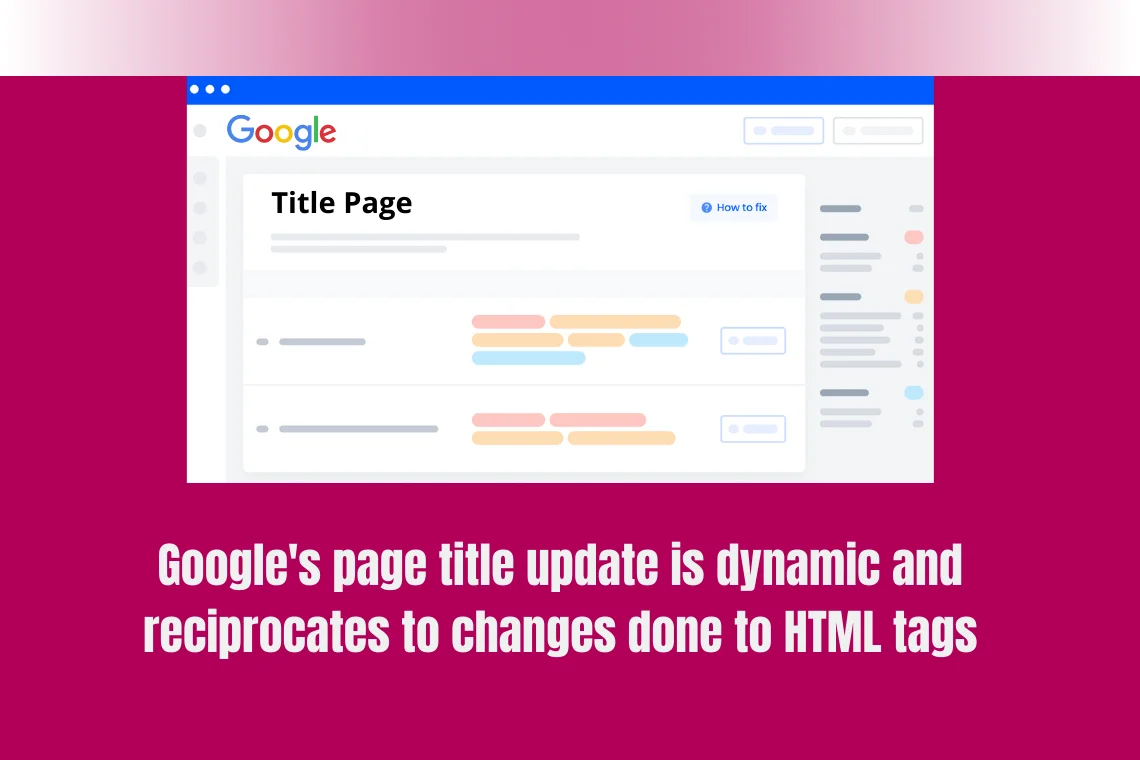Google has come back again with a new update called the page title update. Google’s Danny Sullivan has confirmed that Google is updating the way it creates page titles for SERPs. Our blog is a complete guide for you to know all about this update and how it works? So, let’s find out.
Users use one of the major approaches to determine which search results might be relevant to their query by examining the titles of listed web pages. Therefore, Google search makes great efforts to provide the best titles in search results to connect searchers effectively with the content produced by webmasters and publishers.
Hence, Google was displaying dynamic page titles in the SERP through minor adjustments based on the query issued. But now it has introduced a new system for producing titles regardless of the query.
What is Google’s Page title update and how it impacts SEO?

The page title tag reveals the search engine and the users about the nature of the information available on their web page. It is placed in the head section under the meta tag in HTML. The title tag is what customers can see in the SERPs above URL when searching for a query. Therefore, it is very important for improving SEO.
As we all know, Google has announced a new algorithm update to SEO experts which might encourage website owners and publishers to take a different approach while creating page titles to improve readability and increase the relevance in search results. In this case, a more relevant title will get more clicks.
With the new update, the Google search engine will no longer generate web page titles based on the query; instead, it will produce page titles that best suit all documents in general irrespective of what the user searches.
Ever since the new algorithm update is live in search results, the experts within the SEO community have extensively documented and observed that Google is indeed rewriting page titles by using other text on the page and Google’s Danny Sullivan has also confirmed this. He says that the new algorithm update is using more than HTML text to replace the page titles in instances when it considers a page’s HTML title tag doesn’t adequately describe the page.
Google reviews the other text contained in the page such as the header tags, H1 tags or main visual title on a page, and any other notable text throughout the content that users see when they visit the page. It may also consider the text within links. Sullivan further demonstrated that Google is rewriting title tags because often page title tags fail in describing a page’s topic well. They can be either stuffed with keywords, or too lengthy and sometimes contain no text or boilerplate text.
Thus, Google’s latest page title update is more dynamic and reciprocates to any changes done to HTML tags. It shows that even when you modify the HTML title tag of a page, Google will consider the updated text and react accordingly.
Can we opt out of this update?
There are no exceptions to Google’s new system and websites can’t opt-out of having Google rewriting their page titles. However, Sullivan proposes that Google should provide a feature in the Google search console for website owners to choose whether they want the search engine to replace their HTML title tags or not and can also have the option to retain a few of their original page titles.
Finally, Google believes that the new update creates titles that are easier to read and searchers would prefer the update over Google’s previous method of generating titles.
Conclusion
Although Google is considering a different approach to generate web page titles, webmasters should never conclude that optimizing HTML title tags is not worth it. 80% of the time the original HTML title tags will still be considered. So, webmasters should always focus on creating unique and optimized HTML titles.
If you are concerned about your website’s SEO or rankings, check out our SEO Strategy and Services. Our leading digital marketing agency is a one-stop solution for your multiple problems. Contact us today to get a quote on our SEO Services.




